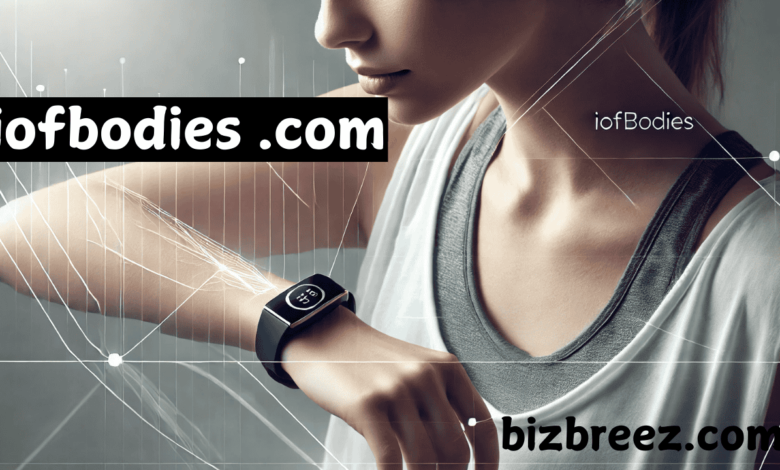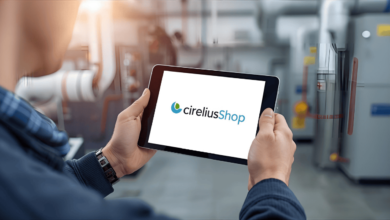iofbodies .com: Exploring the Benefits and Risks of Body-Integrated Devices

In the age of digital transformation, the convergence of technology and biology has led to a groundbreaking development known as the Internet of Bodies (IoB). This emerging field integrates various devices with the human body, collecting, analyzing, and utilizing data for improved healthcare, fitness, and daily life. One platform that seems to be part of this innovative trend is iofbodies .com. In this article, we will explore the concept of IoB, how it works, its applications, the privacy concerns associated with it, and the potential future of this technology.
1. What is the Internet of Bodies (IoB)?
The Internet of Bodies (IoB) is a term that refers to a network of devices that are connected to the human body. These devices can either be external, such as wearables and fitness trackers, or internal, such as medical implants like pacemakers and insulin pumps. The primary goal of IoB is to collect data from the body and use it to monitor health, improve wellness, and provide real-time medical interventions when needed.
IoB technology is becoming increasingly popular, as more people seek ways to monitor their health and fitness levels. Platforms like iofbodies .com are part of this evolving ecosystem, offering a space to learn more about the technologies that make the Internet of Bodies possible. These devices can track a wide range of data points, including heart rate, blood oxygen levels, sleep patterns, and even brain activity. In some cases, these devices can be programmed to deliver immediate responses based on the data they collect, such as adjusting insulin levels or delivering medication.
2. Applications of IoB Technology
The potential applications of the Internet of Bodies are vast and span various industries, from healthcare to fitness and wellness. Below are some key areas where IoB devices are making a significant impact.
Healthcare
In healthcare, IoB devices are transforming the way chronic diseases and medical conditions are managed. Devices such as pacemakers, insulin pumps, and glucose monitors continuously track a person’s health status. For example, a diabetic person can use a glucose monitor that alerts them when their blood sugar levels are too high or low. This real-time data allows healthcare providers to adjust treatments and medications without the patient needing to make a trip to the doctor’s office.
Furthermore, the continuous monitoring enabled by IoB technology can help identify potential health issues before they become serious. For example, sensors embedded within a person’s body can track heart rate variability, enabling early detection of cardiovascular issues. This is where platforms like iofbodies .com could offer a more in-depth look at how these technologies function and provide insights into their benefits and challenges.
Fitness and Wellness
The fitness industry is also benefiting from the advent of IoB devices. Wearables like fitness trackers, smartwatches, and health monitors are already popular, but the next generation of IoB devices goes beyond tracking steps and calories burned. With advancements in IoB, individuals can track more intricate health metrics such as sleep quality, hydration levels, and stress levels. This provides a more comprehensive picture of their health and fitness, allowing them to make more informed decisions about their wellness.
Moreover, IoB technology can help tailor fitness programs to an individual’s specific needs by gathering personalized data. For example, a wearable device can monitor a person’s physical activity and make suggestions for improving workout routines based on their heart rate or activity levels.
Other Potential Applications
The Internet of Bodies can also extend its reach into other sectors, such as agriculture, entertainment, and even automotive industries. For instance, IoB can be used in agriculture to track the health of livestock or monitor crop growth. In the automotive industry, IoB technology could be used to monitor driver health and make safety adjustments if the system detects fatigue or medical distress. In entertainment, IoB could lead to immersive experiences in virtual reality or gaming, where a player’s biometric data dictates the virtual environment.
3. Privacy and Security Concerns of IoB Devices
While the potential benefits of IoB are clear, there are significant privacy and security concerns that must be addressed. Since IoB devices collect sensitive health data, such as heart rate, blood pressure, and even neural activity, ensuring that this data remains private and secure is crucial.
Data Privacy
Platforms like iofbodies .com and other IoB services have access to highly personal data. As the use of these devices grows, so does the concern about how this data is handled. If a hacker gains access to an individual’s health data, the consequences can be severe. Sensitive information could be stolen or misused, leading to privacy violations or even physical harm if the devices are tampered with. Therefore, it is essential for IoB platforms to implement robust encryption and data protection protocols to safeguard users’ information.
Security Vulnerabilities
The connection between IoB devices and the internet also introduces a potential vulnerability. Since IoB devices are part of the broader internet ecosystem, they can be targeted by cybercriminals looking to exploit weaknesses in security. Hackers could potentially take control of medical implants or fitness trackers, adjusting their settings or even disabling them entirely, putting users’ health at risk.
For platforms like iofbodies .com, which may be involved in the creation or promotion of IoB technologies, maintaining a high level of cybersecurity is paramount. It is essential to stay ahead of potential threats and to regularly update the security measures in place to protect users’ health data.
4. Ethical and Social Implications of IoB
The introduction of IoB technologies raises several ethical and social questions that must be carefully considered. These issues include concerns around consent, data ownership, and the potential misuse of the technology.
Consent and Autonomy
As IoB devices are increasingly integrated into people’s lives, it is important to ensure that users maintain full autonomy over their bodies. Consent is a key component here—individuals should have complete control over the data collected by IoB devices and should be fully informed about how this data will be used. For example, if a device collects data on a person’s heart rate, the user should have the right to decide how that information is shared and whether or not it is used for medical purposes.
Data Ownership
Data ownership is another critical ethical issue. IoB devices collect a tremendous amount of personal data, but who owns this data? Is it the individual who generates the data, or the company that created the device? Ensuring clear data ownership laws and policies will be essential to preventing abuse or exploitation of personal health information.
Potential for Exploitation
Lastly, there is the issue of exploitation. As IoB technology becomes more widespread, there is the risk that companies may misuse the data they collect for profit or surveillance. This is a significant concern, and it is important for regulatory bodies to put safeguards in place to prevent the misuse of IoB data.
The Future of the Internet of Bodies
The future of the Internet of Bodies is both exciting and uncertain. As the technology advances, we can expect even more sophisticated devices that provide more comprehensive data, better health insights, and more effective interventions. For platforms like iofbodies .com, this represents an opportunity to become a central hub for information and resources on IoB technologies. However, as IoB continues to evolve, it will be essential to address the ongoing concerns surrounding security, privacy, and ethics to ensure the technology benefits society as a whole.
FAQs
1. What is the Internet of Bodies (IoB)?
The Internet of Bodies refers to a network of devices that are integrated into the human body or worn externally to monitor health, fitness, and other biological data. These devices collect and transmit data for medical purposes or wellness improvement.
2. How does IoB improve healthcare?
IoB allows for continuous monitoring of a person’s health, enabling real-time interventions and early detection of potential health issues. This technology can help manage chronic conditions and optimize treatment plans for individuals.
3. What are the privacy concerns associated with IoB devices?
IoB devices collect sensitive personal data, which could be targeted by hackers or misused. It is essential for IoB platforms like iofbodies .com to implement robust security protocols to protect this data.
4. What ethical concerns surround the use of IoB?
Key ethical concerns include consent, data ownership, and the potential misuse of personal health data. Users should have control over the data collected by IoB devices and know how it will be used.
5. What is the future of IoB technology?
The future of IoB technology holds exciting possibilities for advanced health monitoring, personalized medicine, and smarter fitness devices. However, addressing privacy, security, and ethical concerns will be essential as the technology continues to evolve.



